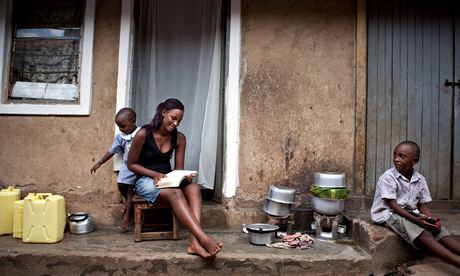HIV/AIDS & Reproductive Health
Source: The Guardian
In a slum in Kampala, Uganda, 16-year-old Lydia dreams of becoming a doctor. But she worries that the amount of schooling she misses every time she has her period is scuppering her chances of success.
"We are sharing the toilets with the boys, and we fear when we go to the toilets [they] will be in there. And so we don't go to school when we have our periods," she says.
Lydia's mixed-sex school has just four latrines for more than 2,000 students, which means that she risks public humiliation every time she uses the facilities. "Some toilets don't have doors and so we fear to enter as people can see or enter the toilets at any time. At the toilets, they don't have water to flush or wash, and so it's complicated to attend school when I have my period."
The plight of girls such as Lydia has prompted several charities to try to boost awareness of women's sanitary needs during menstruation. The coalition – which includes Water Aid, Save the Children, the Institute of Reproductive Health, International Rescue, and Plan – has launched the world's first menstrual hygiene day on 28 May to draw attention to the many girls forced to miss school each month because of inadequate toilet or washing facilities and insufficient access to sanitary towels.
Unesco, the UN's educational, scientific and cultural organisation, estimates that one in 10 girls in Africa will miss school during their period and eventually drop out of school as a result. In India, 66% of girls' schools do not have a functioning toilet. One school study in Ethiopia reported that more than 50% of girls miss between one and four days of school per month due to menstruation.
Campaigners are promoting menstrual hygiene day with the hashtag #MenstruationMatters to raise awareness of the stigma and practical difficulties many girls face. Barbara Frost, chief executive of WaterAid, said: "It's time for all of us to start talking about periods and bring an end to the stigma that still surrounds menstruation. Taboos surrounding periods can take a heavy toll on the health of girls and women in the developing world.

"Without decent toilets or washing facilities, girls' health is put at risk and they are likely to drop out of school rather than face the humiliation of finding somewhere private to change. By talking about periods, we can help normalise this natural process and help girls and women live healthier and more dignified lives."
Alex Kent, international campaigns manager at WaterAid, said: "One in three women don't have access to a toilet. We have to raise the conversation because even though it seems obvious, there is a real stigma to it [menstruation]."
Kent said the issue was essential to gender equality. "Justine Greening [Britain's international development secretary] speaks out about girls empowerment, women's rights and gender equality. But you can't have gender equality if girls don't have basic access to hygiene."
Lorrie King, founder of the charity 50 Cents.Period, a member of the coalition, said there were concerns among some activists that, along with other women's right issues, the campaign for menstrual health had been fought through a western feminist perspective.
"Many of these conversations are assumptive and coming from a place of privilege, and are out of touch with the common realities facing women in the developing world. In order to have successful menstrual hygiene programmes, you have to start where you are, and let the women and girls lead the way to what they say is best for them and their lived experiences, not what you think is best from the outside."
To coincide with menstrual hygiene day, WaterAid is launching a petition to get sanitation and hygiene included in the next set of development goals. The call chimes with that of NGOs, politicians, activists and UN Women who want to see women's rights embedded in the post-2015 goals.
